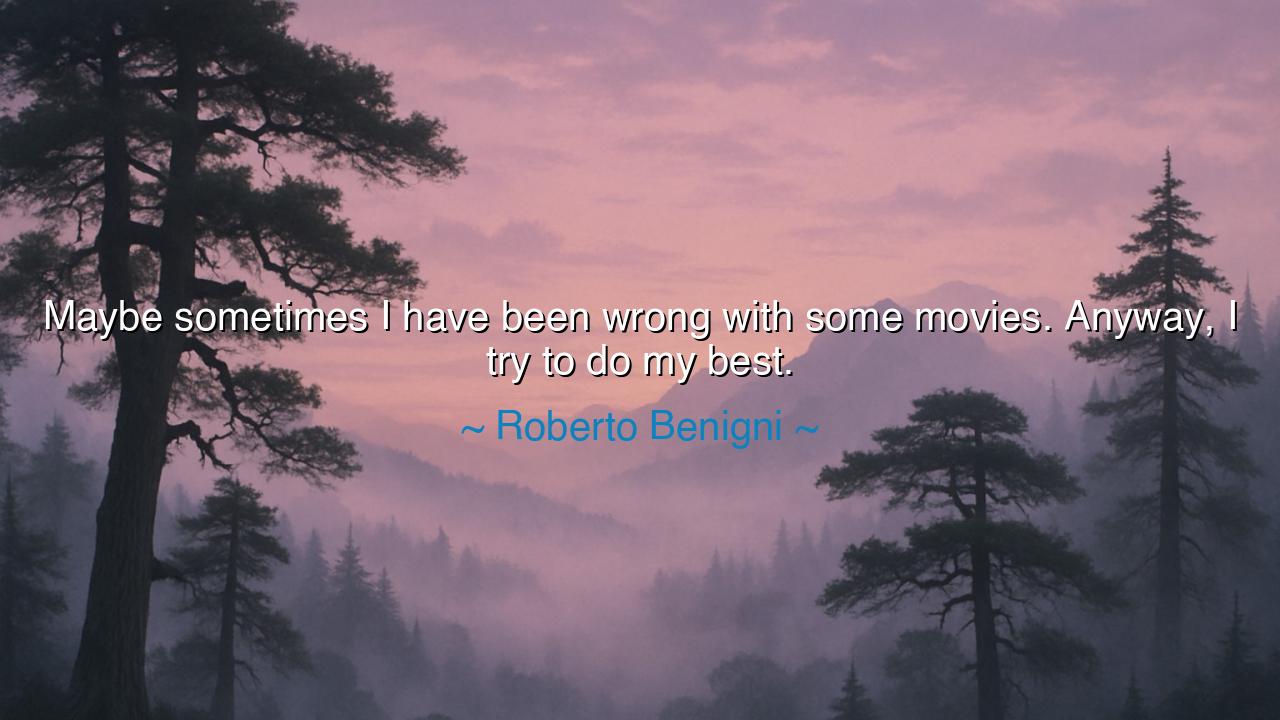
Maybe sometimes I have been wrong with some movies. Anyway, I






Listen, O seekers of wisdom, for the words of Roberto Benigni carry a humble truth, one that speaks to the nature of imperfection, growth, and the endless pursuit of excellence. He said, “Maybe sometimes I have been wrong with some movies. Anyway, I try to do my best.” In these words, Benigni acknowledges a fundamental reality of creation: that failure is an inherent part of the process. Even the most dedicated and talented creators can falter. But in the face of these imperfections, what truly matters is not the absence of failure, but the commitment to always doing one’s best, to continue striving toward improvement and excellence. Benigni’s words speak to the heart of the artist, and to the heart of humanity itself—that we are all flawed, yet we must still strive for greatness.
In the ancient world, the great philosophers and artists understood the essential nature of struggle in the pursuit of virtue. Consider Socrates, who, despite his wisdom, acknowledged that true knowledge comes not from being perfect, but from recognizing one’s ignorance and constantly striving to understand more. Socrates’ commitment to the pursuit of knowledge was grounded in the belief that growth comes not from avoiding failure but from learning from it. Benigni’s admission, like Socrates’, teaches us that acknowledging our flaws is the first step toward greatness—it is only through honesty and self-awareness that we can push beyond the limitations of our past mistakes.
Think also of the great sculptor Michelangelo, who, when carving the David, was said to have once declared that he simply “liberated” the statue from the marble—that it was always there, waiting to be revealed. Michelangelo’s work was not without failures, nor without moments of doubt. Even the greatest artists have to wrestle with their medium, sometimes seeing only imperfection before the perfection emerges. Benigni, in his acknowledgment of the mistakes he has made in his career, embodies the spirit of the artist who continues to seek the highest ideal while understanding that mistakes are part of the process, that imperfection does not diminish the pursuit but enriches it. Michelangelo’s struggles with his marble and Benigni’s acknowledgment of his imperfections both remind us that true creation requires a willingness to fail, to learn, and to keep moving forward.
The heroic journey of Odysseus, as told by Homer in the Odyssey, is another example of the imperfection of human endeavor. Odysseus, though a hero, was constantly faced with challenges, failures, and moments of doubt. Yet he pressed on, learning from his mistakes, and constantly striving to return to his home. His journey was not a straight line—it was a series of ups and downs, of missteps and redirections. In this, he exemplifies the human condition, where success is never guaranteed, and the path is fraught with obstacles. Benigni’s words echo Odysseus’ journey—the understanding that failure is not defeat, but rather part of the greater journey toward mastery and fulfillment.
Benigni’s words also serve as a reminder that perfection is not the goal; the goal is to strive toward doing our best, to pour our heart and soul into our work, even when the results are not as we envision. True greatness, whether in art, philosophy, or life, is not measured by the absence of failure, but by the commitment to continue despite setbacks, to persist in the face of adversity, and to always strive for better. This is the essence of virtue—to keep trying, to keep learning, and to keep growing, despite the inevitable mistakes along the way.
So, young ones, take this lesson to heart: Do not fear failure, for it is an inherent part of the process of creation. Embrace it, and learn from it. Do your best in every endeavor, but understand that even in your imperfections, there is great value. You are not defined by your mistakes, but by your ability to rise again, to keep striving, and to continue pushing toward your highest potential. Benigni’s words remind us that the artist’s journey is not one of perfection, but of constant refinement. In this, there is wisdom, for the greatest works—whether films, sculptures, or lives—are shaped not by flawless execution, but by the persistence of effort and the willingness to keep creating, no matter the obstacles.






AAdministratorAdministrator
Welcome, honored guests. Please leave a comment, we will respond soon